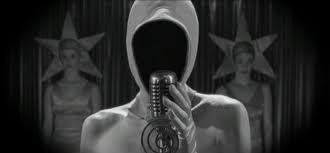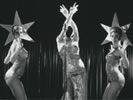Eye For Film >> Movies >> La Antena (2007) Film Review

"Once upon a time there was a city without a voice. Somebody had taken away the voices of all its inhabitants. Many, many years went by and nobody seemed bothered by the silence."
In La Antena (The Aerial), Esteban Sapir realises his mute fairytale dystopia by using all the monochrome expressionist stylisations of silent-era cinema - not that the 'city without a voice' is ever completely quiet. For while we rarely hear a human voice, there is noise, there is music, and there is even, in moments of supposed silence, the clearly audible sound of the film reel itself whirring (as though this really were being shown on a clunky old projector from the 1920s).

And of course, as the quote above suggests, there is text. "They have taken our voices but we still have words," as one character puts it – and so the citizens are still able to communicate by reading each other's lips, signs, notes, mail, or even subtitles (which in this film have a physicality that makes them available for characters as much as for viewers to see).
Here a 'whispered' line can be half-covered with an overcoat to conceal it from prying eyes; one man blows a smoke ring to form the 'o' in his speech; another uses a 'megaphone' to make his subtitles appear larger; words can be angrily swept from the screen; the 'RAT TAT TAT' of a machine gun bursts all over the sky; and a shift to an over-the-shoulder reverse angle shot also reduces a character's subtitled dialogue to mirror writing (now that his words are being viewed from behind). All this wittily deconstructs the conventions of subtitles and intertitles – but it also celebrates the resilience and ingenuity with which humanity finds a way to communicate. Even in the absence of articulated utterances, the written word has taken on its own concrete solidity as a means of expression, allowing something like civilised life to go on in a populace that is otherwise muzzled.
A despotic industrialist named Mr TV, however, who mass-produces 'TV Foods' and who has monopolised the city's ubiquitous television station, is plotting to take away people's words too. To this end, he has abducted a hooded woman, known as 'the Voice' for her mysteriously retained ability to speak, and has strapped her to Dr Y's diabolical, swastika-shaped device, set to begin sending its mesmeric transmission at midnight. It seems that the only people who can stop Mr TV and restore the city's long lost voice are a down-at-heel television repairman, his broken family and the Voice's eyeless son Tomás (who has inherited her powers of speech), who must all race to the abandoned Aerial in the mountains before the city is silenced once and for all.
Reflexive, allegorical and poetic, La Antena is a dizzyingly dense piece of cinema, thriving on paradox, and always matching its medium to its message. Even as it shows a mute nightclub 'singer' who can only lip sync along to a stuck record, it also keeps offering overt quotations from past movies (e.g. Georges Méliès' A Trip to the Moon, Fritz Lang's Dr Mabuse, The Gambler and Metropolis, George Franju's Eyes Without A Face, Richard Fleischer's Soylent Green, Terry Gilliam's Brazil, David Lynch's Eraserhead and Mulholland Drive - the latter, in fact, referenced precisely by the lip syncing scene) - as though to suggest that filmmaking might itself be condemned always to sing the same old tunes.
It is an impression only enhanced by Sapir's decision to confine himself to the black-and-white stylings, quirky sets and outmoded histrionics of cinema's silent era – and yet the director's sheer inventiveness and exuberance enable him to soar above his self-imposed constraints. "Imagination has saved men" is the message passed down to the television repairman from his mother – and imagination is something that Sapir deploys time and time again, saving us from the sort of bland homogeneity or slavish imitation that marks so many other, inferior films.
Sometimes cinema tickles the senses, sometimes it tugs at the heartstrings, sometimes it exercises the intellect – but La Antena transmits to all three at once. For Sapir's film is visually beautiful, mentally stimulating, and thoroughly haunting. Sophisticated to the last, it may allegorise the tyranny of consumerism and the deadening effects of the mass media, but in the end even freedom itself is made to equivocate between miracle and horror, leaving viewers to decide for themselves whether the film's final sounds are the ecstatic cries of a newborn, or a more harrowing expression of Munchian angst.
Either way, it would be dumb not to tune in to this extraordinary film.
Reviewed on: 07 Mar 2008
















